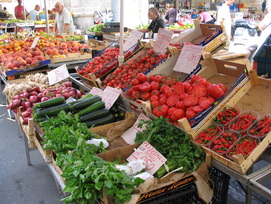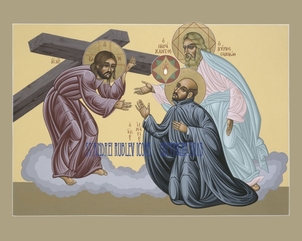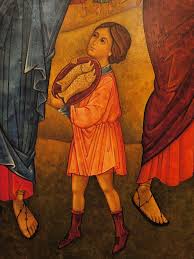 Over the past two weeks there have been many Scripture readings in the liturgy which involve giving food to those in need. One example is the wonderful reading from Exodus 16 in which Moses begged God to feed the Israelites as they trudged through the wilderness on the way to Mt. Sinai. God sent them bread from heaven, (manna), and also quail, so that they would be satisfied. This Sunday we heard two readings like this. The first reading from the Second Book of Kings tells of a man who comes to the prophet Elisha with twenty barley loaves during a time of famine. Elisha used it to feed "a hundred people" and they had bread left over, as God had evidently promised the prophet. The Gospel, John 6:1-15, was about Jesus multiplying five barley loaves and two fish for a huge crowd; there were so many leftovers that John says “there was more than they could eat.” Other than the obvious Eucharistic references, it seems that all of these stories point to the same thing: God’s overwhelming generosity which goes beyond what we might expect or deserve. In the reading from 2nd Kings, Elisha responded to the generosity of an unnamed man who came to him with 20 loaves of bread to share with the community during a difficult time. (2 Kings 4:42-44) This was not just any barley bread. The passage says that it was made from the “firstfruits and fresh grain in the ear.” That means the man brought from the best of his crops. It was the best wheat that he would produce all year, not flour from the left over or merely average wheat. This means it was a huge sacrifice for this man to share as he did. God was so pleased with this man’s offering that He told Elisha He would provide more than they needed; He said that no one would go hungry and that there would be some left over. And indeed this is what took place.  All four gospels contain the story of the multiplication of the loaves and fish, a fact which seems to emphasize how important it is. In each gospel version we see that gathered in a remote spot was a hungry crowd of thousands who were there to hear Jesus preach and to be healed of various ailments. Therefore, Jesus had been giving of Himself all day. Upon hearing how hungry they were and how impossible it would be to feed them, a young boy seemed to come out of nowhere with five barley loaves and two fish which he was willing to relinquish to help feed the masses. (John 6:9) I have never heard anyone talk about his gift, but it occurred to me that he was probably making a large sacrifice in giving up his food to try to help other people. Jesus then gave thanks to His Father and dispersed the bread and fish. In the end there were 12 huge baskets of food left over, more than they had before they started to share! Once again generosity began with a selfless person followed by God making the gesture stretch further than needed. It seems that not only does God love a cheerful giver, but He is simply delighted when we are generous. This is because in being generous we are the being like Him.  Both stories, the man who gave from his best and the boy who gave more than he probably could afford, are examples of the magis, a concept taught by St. Ignatius of Loyola which refers to going ‘above and beyond’ in our actions. In each of these passages a person gave more than just an average gift in order to help others, and in doing so, God went a step further in multiplying the effects of such a deed. Each of the givers was imitating God, whom they obviously knew to be generous, and in their gratitude for God’s generosity to them, they shared what they had. Therefore their gifts were blessed and multiplied by the loving care of God.  It seems to be no coincidence that St. Ignatius of Loyola is celebrated this week. (His feast is on July 31.) Among the many wonderful gifts he gave the world, Ignatius was the founder of the Society of Jesus, also called the Jesuits. He and his first handful of followers, (continued by the Jesuits of today), patterned everything they did on the model of God I just described: generously serving God’s people using one’s gifts, especially shared through education, prayer, and service. St. Ignatius knew firsthand of the great generosity of God. He had pored over the Scriptures for months on end after a difficult injury, a long convalescence, and subsequently as a pilgrim, and he came to know that he had been forgiven many times by God for things he had done. In all his praying and reflection he came to realize that everything God does is oriented toward giving: God is Love and in this love God labors for us. That is, God gives us not only what we need, but He gives us more: He goes beyond. God’s love never stops, though the form in which it comes varies depending on what we need and what is best for us. The term magis comes from the teaching of St. Ignatius Loyola, and unfortunately, it is often misunderstood. The word magis is translated from the Latin to mean 'more' or trying to strive for 'the greater.' A mistake often made in understanding the term is to try to quantify what magis is about and therefore to miss the point of what Ignatius intended. Without a doubt the magis is about generosity, but it is not about quantity, it is about quality. Nor is about being the best or doing what is greatest; rather, it is giving as best one can, going a step further than ‘required.’ * Another mistake is to put the emphasis on what I can do, rather than on the fact that I do it for God. For example, if I wanted to give the poor some bread to eat, the magis is not about how many loaves I bring. It is about how and for Whom I give those loaves. Do I give them lovingly, cheerfully, and with compassion? Am I attentive on the state of the one receiving the bread and not merely on the deed of giving? (In other words, am I focusing on how ‘good I am’ for doing the deed or am I thinking of the other?) Do I give with the end in mind that I don’t just want to feed others: that I want to teach (empower) them how to feed themselves so they will have renewed dignity and become self-sustaining? And most importantly, do I imitate Jesus that they may come to know and love Him better? In the act of sharing, I need to be teaching that this is how God acts. I am not giving for my glory, I am giving for His.  If we give of our goods with love, compassion, and mercy, the material will indeed grow when we share of it, but those who receive will do more than just grow, they will thrive. They need us to listen and see them as people, not just as those in whose hands we thrust a loaf. Just as in biblical times, others will be inspired by our good works and also share what they have, thus multiplying that which is shared. God will bless our efforts through the witness we give by imitating Him. He sends us into the world to do His work, but He does not send us without giving us the tools we need. He gave us a mind to think with, a heart to pray with, and hands and feet to work with. Magis is a 'characteristic' of the will and the heart, but also of action. St. Ignatius understood that service is about being attentive to the movements of the Holy Spirit in our prayer and then acting upon it. But he also knew that being generous is being like God. To paraphrase an old saying, "Imitation is the highest form of praise." If we want to praise God, we need to imitate Him. If we want to imitate Him, then we need to be generous with our gifts and our material goods, but mostly with our love. Therefore, let us reach out to the poor, whether materially, physically, emotionally, or spiritually so that we may make God known and loved, just as St. Ignatius taught in his imitation of the works of Jesus.  May we become more generous of heart! May we give cheerfully as God gives to us so that we may not only live the magis, but teach others who God is through our words and our deeds! May we learn to recognize the movements of the Holy Spirit so that we may be moved to action! May we live in gratitude for the blessings which we have received! May we look to the saints and holy ones who are examples of the generosity of God, imitating them and praying for their intercession! And may we multiply the rich bounty of compassion, mercy, and love which we have received, glorifying the Giver as we share in His gifts! Let us continue to meet in the heart of our generous Lord! Peace! ©Michele L. Catanese *I have used the writing of Fr. James Martin, SJ as an aid in defining the concept of the magis. You can find a complete definition and description of the magis in his book The Jesuit Guide to (Almost) Everything, pages 369-71. The photos are all mine. The first one was taken at an outdoor market in Catania, Sicily. The next two photos were also taken in Sicily. The bread basket was taken during dinner at a farm house just outside Noto; the fish was taken at an outdoor fish market, in Catania, near the site of the first photo. The icon which is next is called St. Ignatius Vision in the Chapel of La Storta, by Fr. William Hart McNichols. It can be found at http://www.standreirublevicons.com/all-categories/product/24-st-ignatius-vision-in-the-chapel-of-la-storta The next image is an inset from an icon of The Multiplication of the Loaves and Fishes by Sr. Patricia Reid, RSCJ. It can be found at https://www.flickr.com/photos/jimforest/5125869952 The last photo is one of mine, taken in the Black Hills of South Dakota. Comments are closed.
|
Heart Speaks to Heart
|

 RSS Feed
RSS Feed

